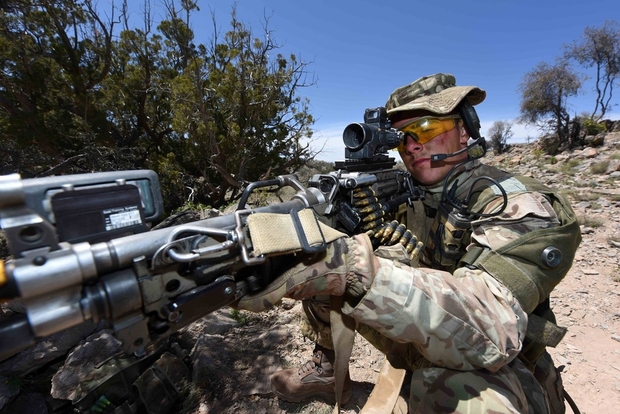Human rights campaigners say British military support for Gulf monarchies ‘major obstacle’ to campaigns for political reform
Human rights campaigners have condemned the British government after it announced it would significantly boost its military support to Oman as part of a continued drive to increase Britain’s military footprint in the Gulf region.
This week the Ministry of Defence announced that it “intends to look at options” for establishing a permanent training facility in the strategically important country and will boost the infantry training it provides to the Omani military by a third.
The new military training agreement between Britain and Oman, a country that has been criticised for suppressing freedom of speech, comes as Defence Secretary Michael Fallon said the British military was working “more closely than ever” with the authorities in Muscat.
Based near the port city of Duqm on the Arabian Sea, the new military facility could provide a permanent base for British troops to train alongside Omani forces.
It follows an announcement in March that the UK and Oman will cooperate with engineering firm Babcock International on outfitting a new naval support shipyard to accommodate Britain’s new Queen Elizabeth-class aircraft carriers, which are due to enter service by 2021.
Earlier this week, a senior Royal Navy officer said the carriers would most likely be deployedimmediately to combat the Islamic State (IS) group.
Existing Omani-UK defence ties were further strengthened on Tuesday when Fallon and the Omani government signed a major “Memorandum of Understanding”.
It will see the British Army deploy 45 infantry training teams to Oman this year, in addition to the 195 UK service personnel who are already based in the country.
Ministry of Defence ✔@DefenceHQ
Def Sec Michael Fallon has today announced the UK will increase its training effort in Oman: http://ow.ly/nytA300hpAM
The move to forge closer military ties with Oman follows a controversial deal to establish a new Royal Navy base in Bahrain, which prompted human rights campaigners to label the move a “reward” for Britain’s silence over torture, attacks on peaceful protesters and clampdowns on freedom of speech in the Gulf.
The base was billed as a return to military operations for Britain “East of Suez”, but to the embarrassment of UK defence officials it is too small to accommodate the Royal Navy’s new ships, which will be forced to dock in Oman.
Like Bahrain, Oman is strategically located near the Strait of Hormuz, which is used to transport nearly a fifth of the world’s crude oil.
Ruled since 1970 by Sultan Qaboos bin Said al-Said, the country is an absolute monarchy and has been condemned for its restrictions on freedom of expression by Human Rights Watch and Amnesty International, which has detailed increasing numbers of “arrests and harassment of political and human rights activists” in its latest report.
Khalfan al-Badwawi, an Omani human rights campaigner who fled the country in 2013 after being repeatedly detained by police, told Middle East Eye that the high level of British military and diplomatic assistance for the Omani government was a “major obstacle” to reform in the country.
He said: “Britain’s military relationship with Oman goes back to the British Empire when Oman was the gateway to India. It’s a major obstacle to human rights campaigners in Oman because of the military and intelligence support from London that props up the Sultan’s dictatorship.”
Speaking earlier this week, Fallon said the training agreement underlined Britain’s commitment to “increase partnerships” in the Gulf. He said: “Oman is our friend. We are working more closely than ever with them across military, counter-terrorism and intelligence fields to tackle shared threats to stability.”
The UK has licensed almost $1.45bn of arms to Oman since 2010, according to the Campaign Against Arms Trade (CAAT) pressure group.
Britain’s willingness to engage with the militaries of Gulf states was underlined earlier this month when soldiers from Bahrain joined troops from Jordan, Lebanon and Nigeria in a training exercise at the British Army’s Infantry Battle School in the Brecon Beacons mountain range in Wales, to the dismay of rights campaigners.
Soldiers from Jordan, Lebanon, Nigeria and Bahrain learn tactics from instructors at Infantry Battle School, Wales
Andrew Smith, of CAAT, said that the despite a deteriorating human rights situation in Oman and Bahrain, the “UK government is pulling out all the stops to get even closer to both regimes”.
He said: “There has been a particular focus on arms sales and military cooperation, with little regard for those being tortured and imprisoned for peaceful protests. The UK should be using its influence to call for human rights and meaningful change, not to boost and empower dictatorships.”
Andy Slaughter, the Labour shadow minister for human rights, said: “Neither historical relationships nor trade and defence deals should encourage the British government to turn a blind eye to human rights abuses. Of course, it is a matter of degrees and Oman is not the worst offender, but where Amnesty International and Human Rights Watch indicate serious concerns, then this should be reflected in what is said and done by ministers.”
In a speech in parliament on Wednesday, Labour leader Jeremy Corbyn said that British foreign policy should have human rights at its centre.
“In foreign policy we must put our promotion of human rights at the centre. We cannot continue to turn a blind eye and, worse, sell arms to countries who abuse human rights either within or beyond their borders,” he said.


